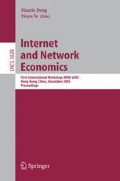Abstract
We study the phenomenon of free-riding in peer-to-peer (P2P) systems via an abstract model of a public good provision game with incomplete information. Each user in the model has an intrinsic contribution cost and decides whether to contribute or free-ride based on the expected benefit derived from the system. We first consider the impact of positive network externalities—common in P2P settings—on the equilibrium level of free riding and show that such network effects reduce free riding slightly but are insufficient to prevent it. We then consider the use of an incentive mechanism based on the detection and punishment of selfish peers, explicitly modelling key design tradeoffs inherent in any realistic detection mechanism. We show that detection and punishment can reduce free riding, but that the risk of falsely accusing cooperative peers can diminish their effectiveness. Finally, we consider what level of detection would maximize the social welfare of the network. We find that a surprisingly low level of detection can be optimal and that the residual level of free riding at optimum depends critically on the overhead of detecting selfishness and the probability of falsely identifying cooperative peers.
Access this chapter
Tax calculation will be finalised at checkout
Purchases are for personal use only
Preview
Unable to display preview. Download preview PDF.
References
Asvanund, A., Clay, K.B., Krishnan, R., Smith, M.D.: An empirical analysis of network externalities in peer-to-peer music sharing networks. Information Systems Research 15, 155–174 (2004)
Krishnan, R., Smith, M.D., Tang, Z., Telang, R.: The virtual commons: Why free-riding can be tolerated in file sharing networks (September 2003)
Figueiredo, D.R., Shapiro, J.K., Towsley, D.: A public good model of availability in peer-to-peer systems. Michigan State University CSE Technical Report 04-27 (2004)
Varian, H.: System reliability and free riding. In: Open Source Software: Economics, Law and Policy (2002)
Adar, E., Huberman, B.: Free riding on gnutella (2000)
Saroiu, S., Gummadi, P., Gribble, S.: A measurement study of peer-to-peer file sharing systems (2002)
Hwang, J., Lee, C.H.: Agent-based modeling for differentiated admission in p2p systems using evolutionary game theory focused on ownership reputation. In: Second Workshop on the Economics of Peer-to-Peer Systems. Harvard University, Cambridge (2004)
Golle, P., Leyton-Brown, K., Mironov, I., Lillibridge, M.: Incentives for sharing in peer-to-peer networks. In: Fiege, L., Mühl, G., Wilhelm, U.G. (eds.) WELCOM 2001. LNCS, vol. 2232, p. 75. Springer, Heidelberg (2001)
Feldman, M., Papadimitriou, C., Chuang, J., Stoica, I.: Free-riding and whitewashing in peer-to-peer systems. In: PINS 2004: Proceedings of the ACM SIGCOMM workshop on Practice and theory of incentives in networked systems, pp. 228–236. ACM Press, New York (2004)
Antoniadis, P., Courcoubetis, C., Mason, R.: Comparing economic incentives in peer-to-peer networks. Comput. Networks 46, 133–146 (2004)
Gradstein, M.: Efficient provision of a discrete public good. International Economic Review 35, 877–897 (1994)
Palfrey, T.R., Rosenthal, H.: Participation and provision of discrete public goods: A strategic analysis. Journal of Public Economics 24, 171–193 (1984)
Palfrey, T.R., Rosenthal, H.: Private incentives in social dilemmas: The effects of incomplete information and altruism. Journal of Public Economics 35, 309–332 (1988)
Nitzan, S., Romano, R.E.: Private provision of a discrete public good with uncertain cost. Journal of Public Economics 42, 357–370 (1990)
Egan, J.: Signal Detection Theory and ROC Analysis. Academic Press, NewYork (1975)
Author information
Authors and Affiliations
Editor information
Editors and Affiliations
Rights and permissions
Copyright information
© 2005 Springer-Verlag Berlin Heidelberg
About this paper
Cite this paper
Kim, BC., Shapiro, J.K. (2005). On the Efficacy of Detecting and Punishing Selfish Peers. In: Deng, X., Ye, Y. (eds) Internet and Network Economics. WINE 2005. Lecture Notes in Computer Science, vol 3828. Springer, Berlin, Heidelberg. https://doi.org/10.1007/11600930_85
Download citation
DOI: https://doi.org/10.1007/11600930_85
Publisher Name: Springer, Berlin, Heidelberg
Print ISBN: 978-3-540-30900-0
Online ISBN: 978-3-540-32293-1
eBook Packages: Computer ScienceComputer Science (R0)

